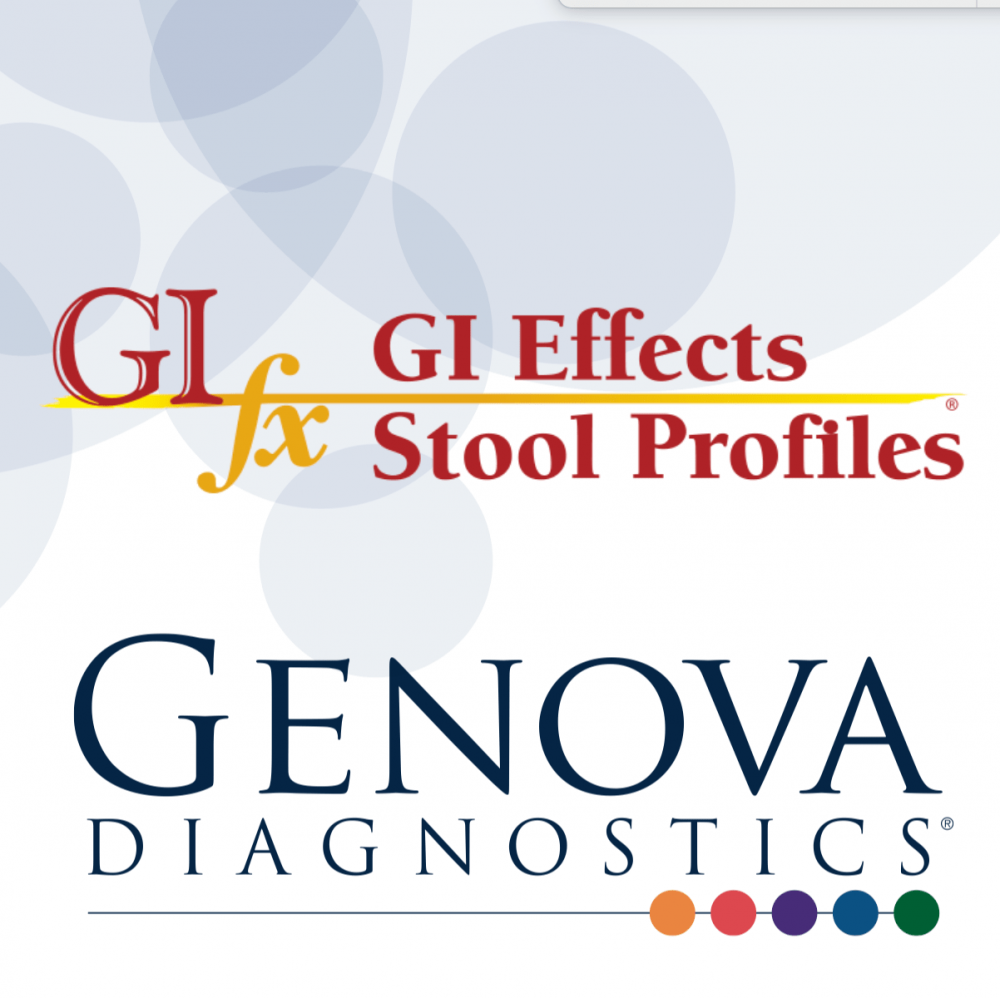
CGP - Genova GI Effects Comprehensive Stool Profile (2200+2205)
When Should the GI Effects Comprehensive Stool Profile Be Considered?
The GI Effects Comprehensive Stool Profile can reveal important information about the root cause of many common gastrointestinal symptoms such as gas, bloating, indigestion, abdominal pain, diarrhea, and constipation. This stool analysis utilizes biomarkers such as fecal calprotectin to differentiate between Inflammatory Bowel Disease (IBD) and Irritable Bowel Syndrome (IBS).
Gut microbes are codependent with one another and with their human host, and the health of one affects the other. A sizable volume of research associates a dysbiotic, or imbalanced gut microbiome with multiple disease states both within and outside of the GI tract. The diverse metabolic activities of the microbiome ultimately impact the human host, and the activities of the human host ultimately affect the health of their microbiome.
The GI Effects Comprehensive Stool Profile Biomarkers
The biomarkers on the GI Effects Comprehensive Profile reflect the 3 key functions of gut health arranged in the “DIG” format: Digestion/Absorption, Inflammation/Immunology, and the Gut Microbiome:
- Digestion/Absorption:
- Pancreatic Elastase-1 is a marker of exocrine pancreatic function.
- Products of Protein Breakdown are markers of undigested protein reaching the colon.
- Fecal Fat is a marker of fat breakdown and absorption.
- Inflammation/Immunology:
- Calprotectin is a marker of neutrophil-driven inflammation. Produced in abundance at sites of inflammation, this biomarker has been proven useful in differentiating between Inflammatory Bowel Disease (IBD) and Irritable Bowel Syndrome (IBS).
- Eosinophil Protein X is a marker of eosinophil-driven inflammation and allergic response.
- Fecal Secretory IgA is a marker of gut secretory immunity and barrier function.
- Fecal Occult Blood Test detects hidden blood; fecal immunochemical testing (FIT) has been recommended by the American College of Gastroenterology as the preferred noninvasive test for colorectal cancer screening/detection.
- Gut Microbiome:
- Metabolic indicators, including short-chain fatty acids and beta-glucuronidase, demonstrate specific and vital metabolic functions performed by the microbiota.
- Commensal Bacteria demonstrate the composition and relative abundance of gut organisms.
- More than 95% of commensal gut organisms are anaerobic and are difficult to recover by traditional (aerobic) culture techniques.
- GI Effects assesses a set of 24 genera/species that map to 7 major phyla.
-
- Bacterial and mycology cultures demonstrate the presence of specific beneficial and pathological organisms.
-
- Bacteria and mycology sensitivities are provided for pathogenic or potentially pathogenic organisms that have been cultured. The report includes effective prescriptive and natural agents.
-
- Parasitology includes comprehensive testing for all parasites on every parasitology exam ordered.
-
-
- GI Effects provides microscopic fecal specimen examination for ova and parasites (O&P), the gold standard of diagnosis for many parasites.
- 6 Polymerase chain reaction (PCR) targets detect common protozoan parasites including Blastocystis spp. with reflex subtyping 1-9, Cryptosporidium parvum/hominis, Cyclospora cayetanensis, Dientamoeba fragilis, Entamoeba histolytica, and Giardia. PCR for organisms is emerging as a highly sensitive method for infectious organism detection.
- Selection of a one-day or three-day sample collection is based on the clinician’s clinical index of suspicion for parasitic infection. If there is no/low suspicion, a one-day sample will likely be adequate. For high suspicion, a three-day sample collection is optimal.
-
- Additional Biomarkers Available:
- Campylobacter
- Clostridium difficile
- Escherichia coli
- Fecal Lactoferrin
- Helicobacter pylori
- Macro Exam for Worms
- Zonulin Family Peptide
- KOH Preparation for Yeast
*Please read the following prior to placing your lab test order*
- theDr.com does not participate in, take assignment, or accept any private insurance. We do not provide super bills and cannot assist with claim resolution for laboratory tests or consultations.
- Orders for this test are accepted from the United States only.
- TheDr.com is unable to ship test kits to the state of New York as per state laws.
- TheDr.com is unable to ship lab kits to P.O. boxes. Please use a residential or business address.
- Some lab providers fill out requisition forms ahead of time with client information. To avoid confusion when processing orders, if you are ordering lab kits for multiple people, please place a separate order for each person.
- After you order a test kit, completing the test is your responsibility.
- Once thedr.com has received your test results, the results will be uploaded to your HIPAA compliant client portal and you will receive an email instructing you how to access them.
- Please contact testing@thedr.com with questions.
